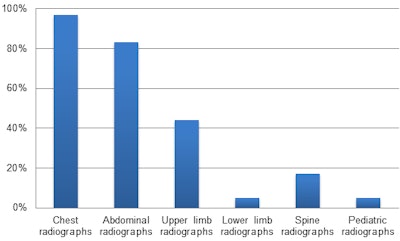
More than three-quarters (77%) of junior doctors wish they had experienced more radiology teaching in their undergraduate curriculum, according to a survey of 150 junior doctors from 29 U.K. medical schools. They were particularly keen on learning more about skeletal radiographs and major trauma CT.
U.K. researchers surveyed foundation doctors across four National Health Service (NHS) trusts. A foundation doctor is a grade of medical practitioner in the U.K. undertaking the Foundation Programme, a two-year, general postgraduate medical training program that forms the bridge between medical school and specialist/general practice training.
The research team led by Dr. L. Bell from the Severn Deanery in Bristol, U.K., sought to better understand the undergraduate radiology curriculum, against the backdrop of the Royal College of Radiologists (RCR) Undergraduate Radiology Curriculum (URC). Most doctors wanted more radiology training and didn't feel adequately prepared in some areas, they stated in an e-poster from the recent RCR 2018 annual meeting in Liverpool, U.K.
Surveying foundation doctors
The RCR aims to prepare foundation doctors with necessary knowledge and skills to routinely arrange and correctly interpret basic radiological investigations in the context of the individual patients, with understanding of applicability, limitations, and impact on patient safety.
Most literature leading to and assessing the curriculum has focused on the opinions of consultants and medical students, not foundation doctors, according to Bell and colleagues.
"Foundation doctors are in the uniquely advantageous position of having very recently been through undergraduate medical training, as well as presently working at the level that the URC is designed to prepare for," they wrote. "This is the first study to assess undergraduate radiology teaching using foundation doctors as the subjects."
The researchers surveyed 150 foundation year 1 and 2 doctors across four NHS hospital groups. They used a mixture of open and closed questions to explore the doctors' preferences of how undergraduate radiology teaching should be delivered.
Of the doctors surveyed, 77% wished they had had more radiology training, and 92% said radiologists were best-suited to deliver teaching, Bell and colleagues found. In addition, small group sessions or integrated into clinical teaching would be the most helpful, according to the survey results.
Proportion that felt their medical school training gave them confidence to interpret different radiographs

"Foundation doctors felt their undergraduate radiology teaching gave them confidence in interpreting chest, abdominal, upper limb, and lower limb radiographs," the study authors wrote. "Confidence was less with spine and pediatric radiographs."
Foundation doctors also expressed confidence their training prepared them to identify the majority of emergency conditions on chest and abdominal radiographs but less for skeletal radiographs and even less so for major trauma CT.
"Teaching of skeletal radiographs and major trauma CT should not be neglected, and more frequent and improved teaching in these areas is necessary to meet the standards of the curriculum," the authors wrote.
Bell and colleagues suggested foundation doctors should be consulted more when developing an undergraduate radiology curriculum.



















